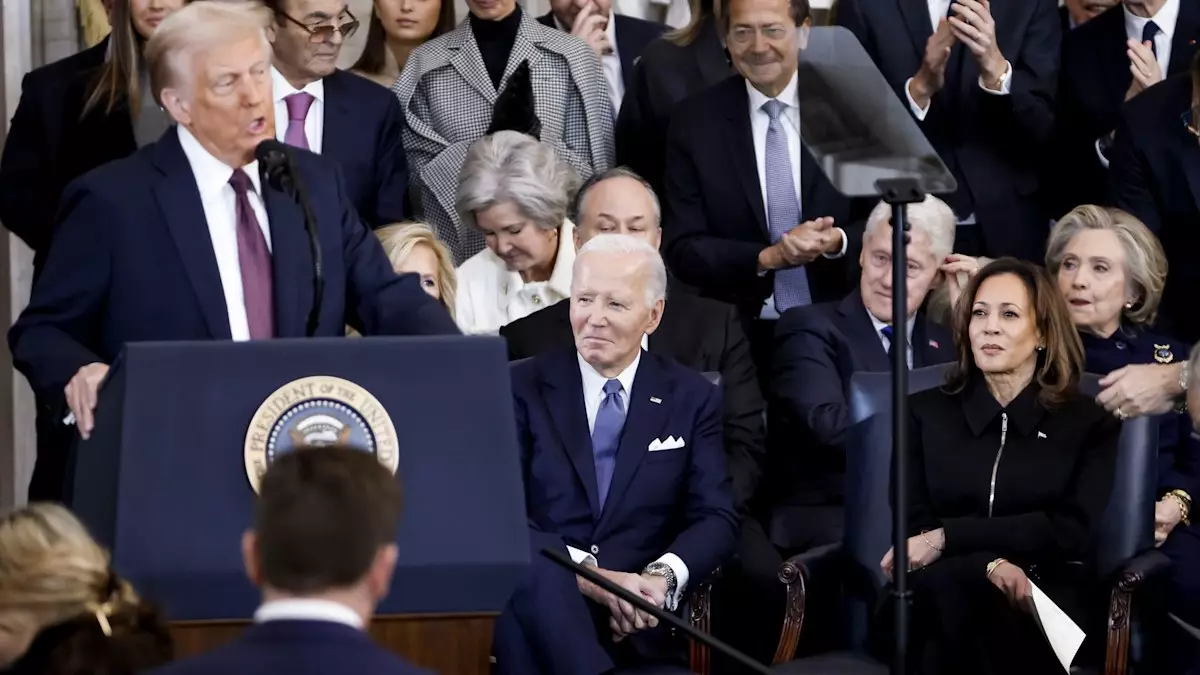Donald Trump’s inaugural address was anything but subtle. He took the opportunity to assert his vision for America in the face of both supporters and detractors. With former presidents and his family looking on, Trump’s speech quickly diverged into a tirade against his political rival, Joe Biden. It was clear from the onset that Trump aimed to seize the narrative by painting Biden as incompetent in times of crisis—a theme he would return to throughout his speech. The palpable tension was highlighted by the presence of Biden and Kamala Harris, both visibly stoic as Trump delivered his remarks, further underscoring the divisive atmosphere.
Trump’s jab at Biden acted as a springboard into a broader critique of his predecessors and the political establishment, as he positioned himself as the savior of American values and prosperity. It’s intriguing how political rhetoric can shape public perception, and Trump’s aggressive posture exemplified how divisive that rhetoric can be.
Central to Trump’s speech was the assertion that his recent election served as a mandate for transformative change. He proclaimed, “I am here to reverse a horrible betrayal,” signaling with these words a commitment to overturning policies enacted during previous administrations. This desire to ‘give power back’ to the American people appeared as a rallying cry, albeit one that elicited mixed reactions from listeners.
What is particularly interesting about this claim is how it frames Trump not just as a political leader but as a historical figure tasked with a mission of restoration. He referred to the “decline” of America, evoking a sense of nostalgia for a bygone era, while simultaneously positioning himself as the antidote to that decline. The dramatic language used to describe his challenges, such as being “tested and challenged more than any president in our 250-year history,” serves to elevate his narrative, fostering a hero archetype among supporters.
Trump didn’t shy away from discussing the personal dangers he faced, highlighting a shooting incident during a Pennsylvania rally. By referencing his brush with death, he not only underscored the volatility of modern American politics but also framed his survival as divinely ordained. This assertion that he was saved “for a reason” to fulfill a higher purpose adds an almost messianic quality to his rhetoric.
Analyzing this moment brings to light the role that personal narrative plays in political discourse. By linking his survival to a greater mission for the country, Trump bolstered his image as a leader willing to sacrifice for the nation—an emotionally compelling angle that resonates deeply with his base. Yet, this reliance on personal narrative also raises questions about vulnerability and authenticity in leadership.
As Trump moved beyond emotional appeals, he delved into specifics about his policies. His mention of “hardline immigration laws” and controlling the Panama Canal reveals a focus on national sovereignty that many of his supporters champion. Alongside these contentious topics, his declaration of a “national energy emergency” hints at an administration aiming for self-sufficiency and energy dominance.
However, one must interrogate the implications of such policies. For instance, while promoting fierce immigration law enforcement may play well with his base, it also risks further polarizing the American public and complicating international relations. This dichotomy highlights the challenge of balancing nationalistic policies with the realities of a deeply interconnected world.
In concluding his address, Trump painted an ambitious picture of a “golden age” for America, filled with promises of prosperity, strength, and unity. His commitment to restoring American pride taps into a collective desire for self-assurance in an increasingly uncertain era. Yet, this optimism feels layered; while it aims to inspire hope, it also runs the risk of overselling a vision that requires substantive groundwork to be realized.
Trump’s promise that “we will not fail” can serve as a galvanizing force for supporters, yet it also leaves room for skepticism among critics who see his expectations as unrealistic. The dissonance between such grand promises and the challenging realities of governance raises critical questions about accountability and the nature of presidential leadership.
Trump’s inaugural address was an intricate tapestry woven with themes of personal struggle, national revival, and policy vision. While it energized his supporters with messages of resilience and ambition, it also laid bare the rifts within American society that could complicate efforts toward unity and progress. The speech will likely remain a touchstone for ongoing debates about identity and direction in contemporary America.
